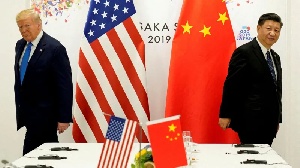- Home - Entertainment
- Lifestyle News
- Year In Review
- Music News
- Entertainers
- Entertainment Archive
- Entertainment Photos
- Jokes
- Entertainment Headlines
- Ameyaw Debrah
- Brown GH
- Celebrities Buzz
- GH Base
- Ghana Celebrities
- Gh Gossip
- GH Page
- GH Splash
- Hot Gossip GH
- YEN
Television of Friday, 4 April 2025
Source: www.ghanawebbers.com
China and US are at each other's throats on tariffs, and neither is backing down
American companies aiming to sell in China face a major setback. A 34% price increase on all US goods will hurt many businesses.
This is particularly damaging for US agricultural producers. They already faced tariffs of 10% to 15% on their products. Now, the additional 34% could drive most of them out of the market.
Beijing appears unconcerned about sourcing chicken, pork, and sorghum elsewhere. This move also strikes at President Trump's support base in the Midwest.
Analysts are worried about global implications. Supply chains are now highly internationalized. Components for products come from all over the world.
Economic distress can spread quickly between countries. This could lead to severe consequences for global trade.
The two largest economies are currently in conflict with no signs of resolution. The timing of Beijing's announcement raises questions.
China revealed its "resolute countermeasures" against Trump's tariffs late Friday night. This was also a public holiday in China.
The timing suggests several possibilities:
1. The government wanted to downplay the news domestically.
2. They announced it as soon as their plans were finalized.
3. Beijing may have given up on negotiating before Trump's tariffs take effect next week.
If it's the last reason, this is troubling for the global economy. It indicates that reaching an agreement between these superpowers may be more difficult than expected.
President Xi's reaction to Trump's tariffs shows his attitude clearly. While other governments watched closely, Xi was planting trees with his Politburo colleagues.
This act projected calmness towards Trump’s actions, signaling indifference from China.
There is still potential for a deal between the US and China, but tensions remain high. Another possibility is that China increases trade with other nations, including former US allies.
This shift would harm not only American companies but also consumers facing higher prices due to Trump's tariffs.











